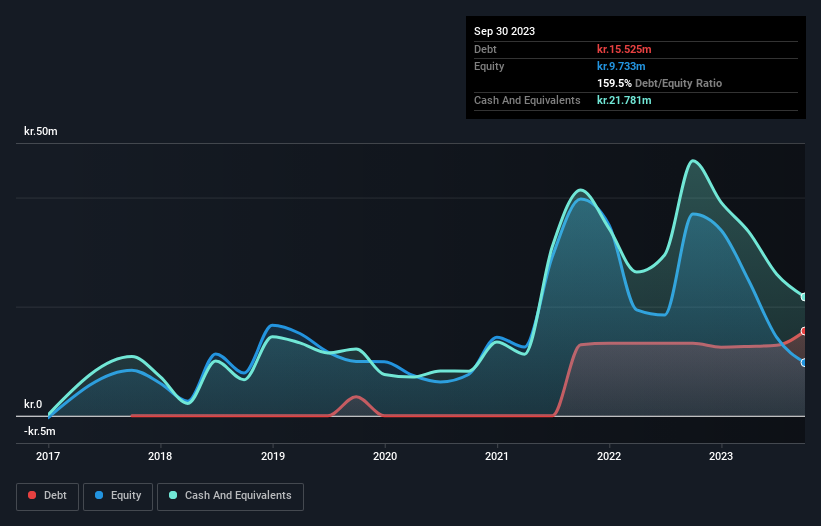Health Check: How Prudently Does Initiator Pharma (STO:INIT) Use Debt?

Howard Marks put it nicely when he said that, rather than worrying about share price volatility, 'The possibility of permanent loss is the risk I worry about... and every practical investor I know worries about.' So it might be obvious that you need to consider debt, when you think about how risky any given stock is, because too much debt can sink a company. Importantly, Initiator Pharma A/S (STO:INIT) does carry debt. But the real question is whether this debt is making the company risky.
What Risk Does Debt Bring?
Debt is a tool to help businesses grow, but if a business is incapable of paying off its lenders, then it exists at their mercy. If things get really bad, the lenders can take control of the business. While that is not too common, we often do see indebted companies permanently diluting shareholders because lenders force them to raise capital at a distressed price. Of course, the upside of debt is that it often represents cheap capital, especially when it replaces dilution in a company with the ability to reinvest at high rates of return. When we think about a company's use of debt, we first look at cash and debt together.
Check out our latest analysis for Initiator Pharma
What Is Initiator Pharma's Debt?
You can click the graphic below for the historical numbers, but it shows that as of September 2023 Initiator Pharma had kr.15.5m of debt, an increase on kr.13.3m, over one year. But it also has kr.21.8m in cash to offset that, meaning it has kr.6.26m net cash.

A Look At Initiator Pharma's Liabilities
According to the last reported balance sheet, Initiator Pharma had liabilities of kr.2.04m due within 12 months, and liabilities of kr.15.5m due beyond 12 months. Offsetting this, it had kr.21.8m in cash and kr.5.50m in receivables that were due within 12 months. So it actually has kr.9.72m more liquid assets than total liabilities.
This surplus suggests that Initiator Pharma has a conservative balance sheet, and could probably eliminate its debt without much difficulty. Simply put, the fact that Initiator Pharma has more cash than debt is arguably a good indication that it can manage its debt safely. There's no doubt that we learn most about debt from the balance sheet. But ultimately the future profitability of the business will decide if Initiator Pharma can strengthen its balance sheet over time. So if you're focused on the future you can check out this free report showing analyst profit forecasts.
Given its lack of meaningful operating revenue, Initiator Pharma shareholders no doubt hope it can fund itself until it has a profitable product.
So How Risky Is Initiator Pharma?
We have no doubt that loss making companies are, in general, riskier than profitable ones. And the fact is that over the last twelve months Initiator Pharma lost money at the earnings before interest and tax (EBIT) line. Indeed, in that time it burnt through kr.28m of cash and made a loss of kr.27m. With only kr.6.26m on the balance sheet, it would appear that its going to need to raise capital again soon. Even though its balance sheet seems sufficiently liquid, debt always makes us a little nervous if a company doesn't produce free cash flow regularly. When analysing debt levels, the balance sheet is the obvious place to start. However, not all investment risk resides within the balance sheet - far from it. These risks can be hard to spot. Every company has them, and we've spotted 4 warning signs for Initiator Pharma (of which 1 is significant!) you should know about.
If you're interested in investing in businesses that can grow profits without the burden of debt, then check out this free list of growing businesses that have net cash on the balance sheet.
If you're looking to trade Initiator Pharma, open an account with the lowest-cost platform trusted by professionals, Interactive Brokers.
With clients in over 200 countries and territories, and access to 160 markets, IBKR lets you trade stocks, options, futures, forex, bonds and funds from a single integrated account.
Enjoy no hidden fees, no account minimums, and FX conversion rates as low as 0.03%, far better than what most brokers offer.
Sponsored ContentNew: AI Stock Screener & Alerts
Our new AI Stock Screener scans the market every day to uncover opportunities.
• Dividend Powerhouses (3%+ Yield)
• Undervalued Small Caps with Insider Buying
• High growth Tech and AI Companies
Or build your own from over 50 metrics.
Have feedback on this article? Concerned about the content? Get in touch with us directly. Alternatively, email editorial-team (at) simplywallst.com.
This article by Simply Wall St is general in nature. We provide commentary based on historical data and analyst forecasts only using an unbiased methodology and our articles are not intended to be financial advice. It does not constitute a recommendation to buy or sell any stock, and does not take account of your objectives, or your financial situation. We aim to bring you long-term focused analysis driven by fundamental data. Note that our analysis may not factor in the latest price-sensitive company announcements or qualitative material. Simply Wall St has no position in any stocks mentioned.
About OM:INIT
Initiator Pharma
A clinical stage life science company, develops drugs targeting unmet medical needs within the central and peripheral nervous system.
Excellent balance sheet low.
Market Insights
Community Narratives




